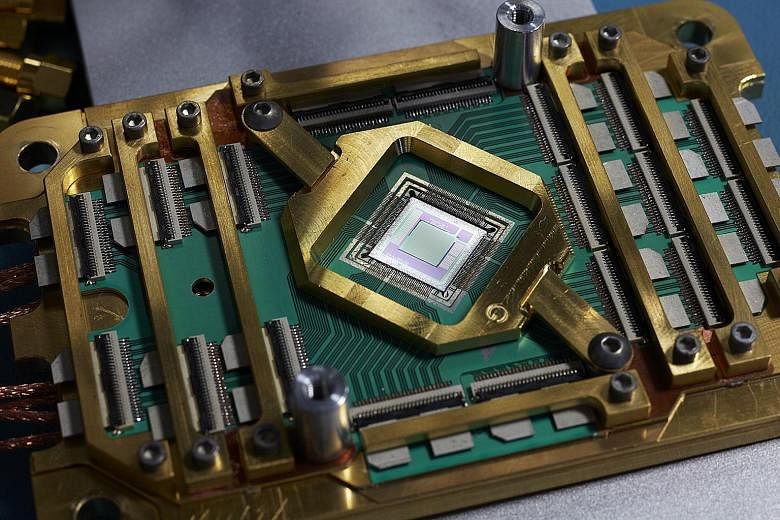FRANKFURT • Volkswagen is delving into quantum computing. BMW is building a giant new data centre. And Bosch last week announced plans to construct a factory to build chips for self-driving cars.
The moves are part of an expanding effort by European carmakers and suppliers to build the computing capacity - big data - they will need as vehicles digitise and become driverless.
Cars will need to constantly communicate, absorbing and analysing information from thousands of vehicles at once, to make decisions to smooth traffic flow, save fuel and avoid hazards. That presents a huge new challenge for companies traditionally focused on manufacturing.
"The processing power needed to deal with all this data is orders of magnitude larger than what we are used to," said Mr Reinhard Stolle, a vice-president in charge of artificial intelligence at German automaker BMW, which is building a data centre near Munich that is 10 times the size of the company's existing facility.
"The traditional control engineering techniques are just not able to handle the complexity anymore."
Big data is a challenge for all automakers, but especially German companies because they target affluent customers who want the latest technology. At the same time, the focus on computing pits the automakers against Silicon Valley tech companies with far more experience in the field, and creates an opening for firms like Apple and Google, which are already encroaching on the car business.
-
Forging a road map to the future
-
Here's how two German carmakers are using big data.
VOLKSWAGEN
The carmaker has used a computer by D-Wave Systems - a Canadian maker of computers that apply quantum physics principles - to show how it can steer the movements of 10,000 taxis in Beijing at once, optimising their routes and thus reducing congestion.
Traffic patterns morph constantly, so the challenge is to gather and analyse vehicle flows quickly enough for data to be useful. The D-Wave computer was able to process in a few seconds information that would take a conventional supercomputer 30 minutes, said Dr Florian Neukart at a Volkswagen lab in San Francisco.
BMW
Last year, it hired more IT specialists than mechanical engineers, saying it needs huge data-crunching capability. It has a fleet of 40 prototype autonomous cars it is testing in cooperation with chipmaker Intel, self-driving technology firm Mobileye and auto components supplier Delphi.
BMW uses artificial intelligence (AI) to analyse reams of data compiled from test drives - in a quest to build cars that can learn from experience and eventually drive themselves. After test sessions, hard disks in the cars are physically removed and connected to racks of computers at BMW's research centre near Munich.
The data collected would fill a stack of DVDs 96km high, said Mr Reinhard Stolle, a vice-president in charge of AI at BMW. NYTIMES
Google has long been working on self-driving or "autonomous" cars, and chief executive of Apple Tim Cook said this month that the company best known for making iPhones is focusing on autonomous systems for cars and other applications. That has put pressure on automakers.
German companies in particular have made investments in ride-sharing services, in part to combat the rise of Uber, and are now looking further into the future. Efforts by Volkswagen, trying to remake itself as a technology leader as it recovers from an emissions scandal, show how far into exotic realms of technology carmakers are willing to go.
Volkswagen recently joined the handful of large corporations worldwide that are customers of D-Wave Systems, a Canadian maker of computers that apply the mind-bending principles of quantum physics. While some experts question their usefulness, D-Wave computers - housed in tall, matte black cases that recall the obelisks in the science fiction classic 2001: A Space Odyssey - can, in theory, process massive amounts of information at unheard-of speeds.
Volkswagen's chief information officer Martin Hofmann is a believer. "For us, it's a new era of technology," Mr Hofmann said in an interview at Volkswagen's factory complex in Wolfsburg, Germany.
First theorised in the 1980s, quantum computers seek to harness the strange and counter-intuitive world of quantum physics, which studies the behaviour of particles at the atomic and sub-atomic level.
While classical computers are based on bits with a value of either 1 or 0, the qubits in a quantum computer can exist in multiple states at the same time. That allows them, in theory, to perform calculations that would be beyond the powers of a typical computer.
NYTIMES

